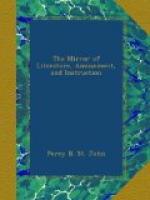That is, indeed, an ill-wind which blows no good. We owe every thing, over and above mere subsistence, to the wickedness of the people of England. Who built Sydney? Convicts. Who made the excellent roads from Sydney to Parramatta, Windsor, and Liverpool? Convicts. By whom is the land made to produce? By convicts. Why do not all our labourers exact high wages, and, by taking a large share of the produce of labour, prevent their employers from becoming rich? Because most of them are convicts. What has enabled the landowner readily to dispose of his surplus produce? The demand of the keepers of convicts. What has brought so many ships to Port Jackson, and occasioned a further demand for agricultural produce? The transportation of convicts. What has tempted free emigrants to bring capital into the settlement? The true stories that they heard of fortunes made by employing the cheap labour of convicts. But here are questions and answers enough. The case is plain. Nearly all that we possess has arisen from the happy influence of penal emigration and discipline, on production, distribution, and consumption. Thanks to the system of transportation, we have had cheap labour and a ready market; production, consequently, has exceeded consumption; and the degree of that excess is the measure of our accumulation—that is, of our wealth.
The transportation of at least ten males for one female, maintains a great disproportion between the sexes. This is the greatest evil of all.
A Rover.
On the banks of the Illinois, I met with a labouring man, who was always tipsy without ever being drunk. Enervated by dram-drinking, he had not the courage to obtain a bit of forest and settle; but he could earn seven shillings a day by his labour. When I spoke to him, he complained of low wages. “At New York, friend,” said I, “five shillings a day are thought quite enough.” “I know that,” he answered; “I was born there, and came here to get eight shillings a day, which, I was told, was the lowest rate hereabouts.” It turned out that he never worked more than three days in the week, and that, in order to obtain twenty-four shillings a week by three days’ labour, he had made a circuitous voyage of some thousand miles from the place where he was born, and where he could have earned thirty shillings a week by working every day.
Slang.
The base language of English thieves is becoming the established language of the colony. Terms of slang and flash are used, as a matter of course, every where, from the gaols to the Viceroy’s palace, not excepting the Bar and the Bench. No doubt they will be reckoned quite parliamentary, as soon as we obtain a parliament.
Bush-ranging
Is a dreadful evil, being a kind of land piracy. None but back settlers, it is true, are exposed to its burnings, rapes, and massacres; but these are as much British subjects as the inhabitants of Sydney or of Downing Street. And, if the inhabitants of towns escape those horrors, they are liable to be murdered in a quiet way, and their property is exposed to every kind of depredation. Their actual losses by robbery, including the expense and loss of time occasioned by prosecutions, are very great.




